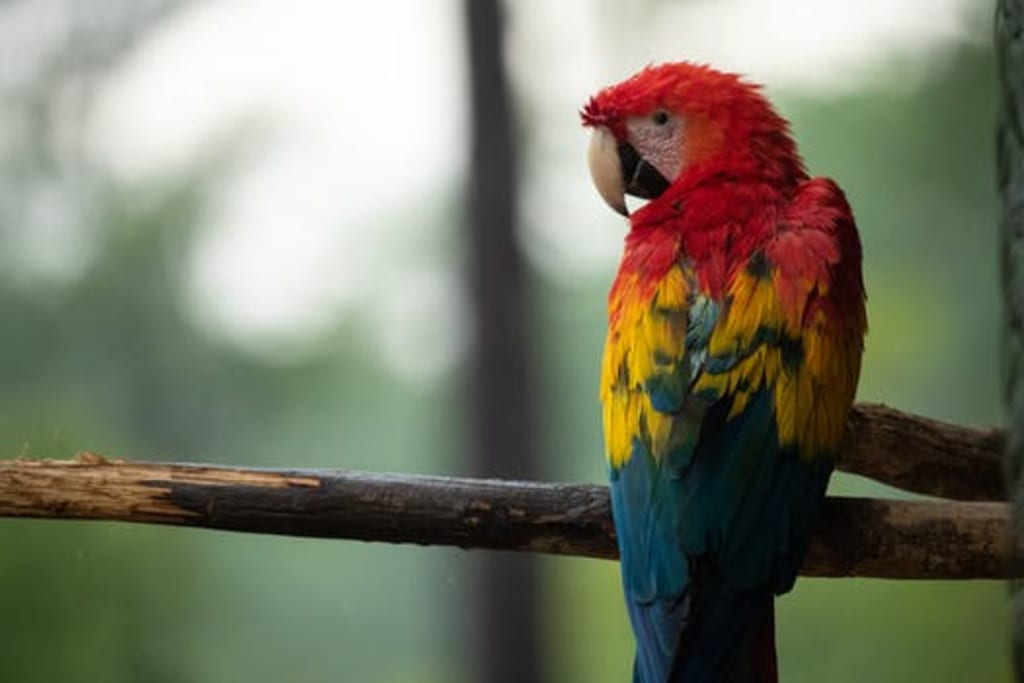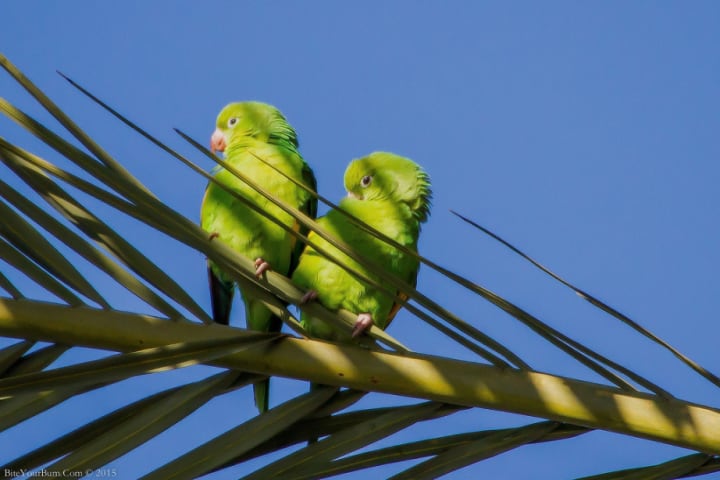Things You Should Know Before Owning a Parrot
A comprehensive guide. Owning a parrot might not be as easy as you think.

You walk into a pet store, and you're suddenly bombarded with a variety of musky smells and noises from animals. Dogs barking, cats meowing. As you walk around, you hear chirping; a variety of parrots. A thought crosses your mind and you decide you want a budgie (parakeet). So you buy a cage, a couple of toys, a bag of seeds, and a bird.
You point out to the bird you want, and you watch as they fish around for the bird. The worker then stuffs it in a box with holes, and you go to the register to pay for everything you picked out. You take them home, set up its cage, food, toys.
Putting the bird in the cage, you see it rummaging around, picking at its food, and messing with its toys. You bought it everything it needed, so that's it... right?

source: https://ahbelab.com/2016/03/09/birds-of-a-feather-the-parrots-of-l-a/
What Your Feathery Friend Needs
Parrots are intelligent and complicated to take care of despite the ease of being able to procure one. Seeds alone don't give them the nutrients they need, some toys can be dangerous even if you get them in a pet store, and even certain cleaning materials can be toxic and deadly to them.
Birds are also social creatures; simply having one is okay IF you can give them the time and companionship they crave, which coming from a bird owner of seven, is a lot of time.
I will make this as comprehensive as I can, while cutting down to the bare necessities. There's a lot that goes into taking care of them, so if you're interested in getting one, or more than one, ask yourself this question: How do I take care of a parrot?
Food
First and foremost, food is the most important aspect of taking care of your parrot. Of course, each breed of bird has specific dietary needs, so I'm just strictly speaking for parrots.
Seeds are alright, but keep in mind not all seeds are good for them. Sunflower seeds are okay for an occasional treat, as your parrot can get extremely addicted to them and they contain a high fatty content.
Safflower, millet, oats, buckwheat and canary seeds are what would be in your typical bag of seeds. Be sure to check the content of each bag of seeds and what they possess. Seeds shouldn't be a staple, but they do contain a lot of nutrients and vitamins that a parrot might not be able to receive from regular fruits and vegetables (like Quaker parrots!). So be sure to mix them in a bowl along with some fruits and vegetables.
Speaking of fruits and vegetables, not all of them are good for parrots. In fact, some seeds in different foods can poison your parrot. It would be essentially like feeding them cyanide. Before giving your parrot any fruit or vegetable, make sure you wash them thoroughly so they don't get sick.
Parrots can actually eat most fruits, just be sure to pit cherries, peaches, apples, apricots, nectarines, and plums because feeding them the seeds and the pit can poison them since they contain cyanide-like substances. Bananas are also safe. My parrots particularly enjoy them!
The worst thing you could feed your parrot, other than chocolate, which is a BIG no-no, is avocados. I repeat, do not feed your bird avocados, and yes guacamole counts. The flesh, pit, and skin is highly toxic for them and can poison your parrot's digestive system. Another unsafe fruit is the tomato, since it is highly acidic.
As for vegetables, unsafe vegetables include onions (which can cause red blood cells to rupture and lead to anemia), garlic, cabbage, kale, and I know mushrooms aren't really a vegetable, but I'll lump them in here too.
Attention, Affection and Enrichment
Birds are incredibly social and are used to being flocks, so be sure you have a lot of time dedicated to bonding with them. This includes playing with them, training them, and cooing at them like they're the most precious creatures in the world (it's their favorite thing, trust me).
Provide them with proper (safe) perches, enrichment, and toys, but be careful with mirrors. Sometimes birds can get confused and spend a lot of time staring at their reflection thinking it's a companion, and wondering why their "companion" isn't eating. They will try to regurgitate onto the mirror, trying to feed them. It's essentially dangerous because they're basically throwing up repeatedly trying to feed their "friend," so once again, be careful with mirrors.
If you find yourself increasingly busy and are unable to spend a proper amount of time with them, try getting them a companion. However, be mindful of mixing different species of parrots. You wouldn't want to put a parakeet and a macaw together in the same cage; considering the size difference, your parakeet could get hurt.
Some parrots can live up to 100 years old! Even your budgie (parakeet) can live to be 15. This is why if you decide to buy a parrot, especially one like a macaw, be sure you're ready to put the time, patience, and love into taking care of them. It's basically a life commitment.
Speaking of patience, each parrot has a different personality. I had a parakeet who was very trusting, and within the week she was already allowing me to hold her, pet her, and hand feed her. I had another who was an absolute nightmare. He threw his food out of his cage if he didn't like it, and constantly bit me when he didn't get what he wanted. It took a considerable amount of time to get him to trust me.
If you own a parrot this stubborn, it's important to not get mad, and I say this because if you do, they WILL remember and it'll be much harder to gain their trust. That means, don't bang on their cage if they're screeching too much, don't yell, and don't threaten them.
If your parrot is too stressed in its environment, or if they get lonely, they will do something which is known as feather plucking. They'll tug, and pull at their feathers, and it'll look like preening. If you notice your parrot losing a shocking amount of feathers and they're spending a lot of time plucking their feathers out, take them to the vet to make sure they're not sick, or what you can do when this happens.
Also, be sure to find an aviary vet, and try to at least take your parrot there once a year. It's important to find an aviary vet and set them up there, just in case of an emergency. When I was a new bird owner, I didn't realize my parakeet had a lung disease, and on the night she was dying I drove around many places trying to get her looked at, but unfortunately aviary vets are harder to come by and she couldn't get the proper treatment. Had I set her up at an aviary vet, as I should have, she would most likely have lived longer.
Proper care and proper research can let your parrot(s) lead a long healthy life. Each bird has a different personality, and no two birds are the same. They're like family when you take them in, and your parrot will see you in the same light if you treat them with love and respect.
About the Creator
Jessica Jane
Just another writer and performer throwing out life-experiences, advice, and things I find interesting
Find me on Instagram! instagram.com/jurassikuh/






Comments
There are no comments for this story
Be the first to respond and start the conversation.